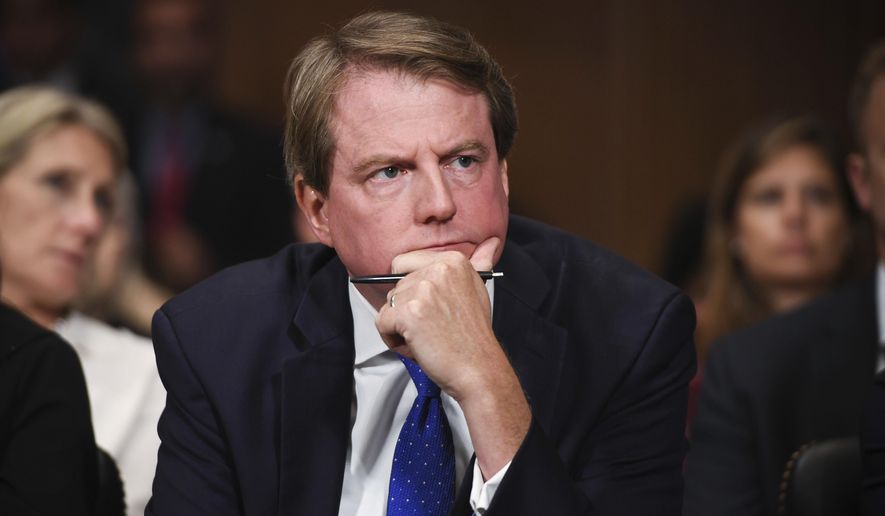A federal judge ruled Monday that former White House Counsel Don McGahn must testify in the House impeachment investigation, undercutting an order from President Trump blocking his cooperation with Congress.
In handing down the decision, U.S. District Judge Ketanji Brown Jackson said that dodging a congressional subpoena is “an affront to the mechanism for curbing abuses that the framers carefully crafted for our protection.”
The ruling dealt a huge defeat to Mr. Trump, who had invoked “absolute immunity” to shield witnesses from testifying in the Democrats’ impeachment probe.
It also could pave the way for other impeachment witnesses who have sought to duck congressional investigators. One potential key witness, former National Security Adviser John R. Bolton, said he would not testify unless a court ordered him to do so.
House Democrats want Mr. McGahn, who was a key witness in former special counsel Robert Mueller’s probe into alleged Trump-Russia collusion, to testify about possible obstruction by justice by the White House.
A senior official at the Justice Department, which is leading the case on behalf of the administration, said they will appeal the decision and seek a stay pending an appeal.
House Judiciary Committee Chairman Jerrold Nadler, New York Democrat, called for Mr. McGahn to testify immediately despite appeals from the Trump administration.
“Now that the court has ruled, I expect him to follow his legal obligations and promptly appear for the committee,” Mr. Nadler said in a statement.
Mr. McGahn’s attorney, William Burck, said his client will comply with the decision unless it is stayed during the appeals process.
The administration’s attorneys had argued that the president’s immunity extends to current and former senior advisers. If aides are not granted immunity, then they would become targets for harassment by Congress, a department attorney argued last month.
Judge Jackson, who was appointed by President Barack Obama, rejected that argument, saying the president cannot pass immunity to his aides.
“However busy or essential a presidential aide right be, and whatever their proximity to sensitive domestic and national security projects, the president does not have the power to excuse him or her from taking an action that the law requires,” she said in a 120-page opinion.
Judge Jackson went so far as to suggest that Mr. Trump may not be immune from testifying. She noted a case involving Harriet Miers, who was a White House counsel for President George W. Bush. She was denied immunity from a congressional subpoena.
The judge noted that the Supreme Court has rejected immunity claims even when it comes to the president.
Mr. McGahn could show up and refuse to answer questions, but Judge Jackson cautioned against that strategy.
“Accordingly, just as with Harriet Miers before him, Donald McGahn must appear before the committee to provide testimony and invoke executive privilege where appropriate,” she wrote.
The Justice Department also had claimed the federal courts should involve itself in a dispute between two other co-equal branches of government. Again, that assertion was denied.
“DOJ promotes a conception of separation-of-powers principle that gets these constitutional commands exactly backward,” Judge Jackson wrote. “In reality, it is a core tenant of this nation’s founding that the powers of a monarch must be split between the branches of government to prevent tyranny.”
Mr. McGahn’s testimony could put back in the headlines Mr. Mueller’s investigation into Russian meddling in the 2016 election, a narrative that for months has taken a back seat to the impeachment inquiry.
Democrats consider Mr. McGahn a critical witness who can shed light on whether Mr. Trump tried to obstruct the Russia probe.
During a span of meetings with Mr. Mueller’s investigators, Mr. McGahn said the president pressed him to fire the special counsel over “conflicts of interest.” Mr. McGahn said he was so distraught by the command that he considered resigning.
Ultimately, Mr. McGahn didn’t resign over the probe but left the administration a year later.
The push to terminate Mr. Mueller was one of 10 possible incidents of obstruction outlined in the special counsel’s voluminous report.
In April, the House Judiciary Committee subpoenaed Mr. McGahn, but the White House blocked his testimony citing “absolute immunity.” The committee followed up with a lawsuit against Mr. McGahn in August.
Judge Jackson’s decision assures that at least three senior officials will be brought in to testify in the impeachment inquiry. The White House has said that Mr. Bolton, his deputy Charles Kupperman and acting Chief of Staff Mick Mulvaney all are immune from testifying.
Mr. Kupperman filed a lawsuit in October asking a different federal judge whether he must comply with a federal subpoena to appear before the impeachment inquiry.
Although the fate of the witnesses had been in limbo, Democrats made preparations to hear from them. Doug Letter, an attorney for the Judiciary Committee, said in a legal filing that the committee could have Mr. McGahn testify in December.
• Jeff Mordock can be reached at jmordock@washingtontimes.com.




Please read our comment policy before commenting.